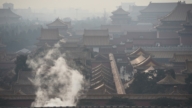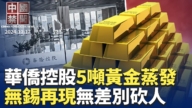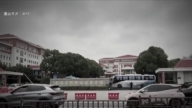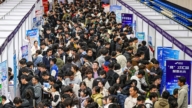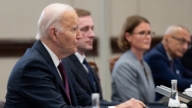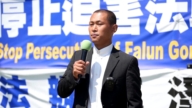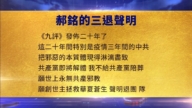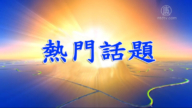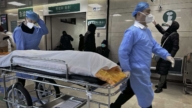【新唐人2014年02月21日訊】週三,大陸最高法院新聞中心與中國互聯網協會,邀請網絡專家、媒體人,以及微博「大V」名人等召開座談會,探討新媒體時代的司法公開、公正。而評論指出,中共一邊迫害人權,控制言論,一邊又邀請網絡人士談司法公正,等於緣木求魚。
大陸最高法院的新浪官方微博,公布了19號召開的「新媒體時代的司法公開座談會」,出席會議的有:網絡信息管理機關、中共主要新聞媒體、各大網絡媒體的領導、專家和學者,以及最高法院院長周強、副院長景漢朝和各業務庭負責人。
微博說,座談會圍繞網絡輿論環境,運用新媒體推進司法公開等展開探討。周強聽取網絡媒體專家、學者和網友的發言後,要求各級法院進一步推進司法公開、公正司法。
大陸自由撰稿人劉逸明指出,在中國人權缺失,司法越來越腐敗的情況下,最高法院邀請網絡人士探討的所謂司法公正,作秀成分居多。
大陸自由撰稿人劉逸明:「中國的新聞自由、言論自由都被官方嚴密控制的,最近這兩年這方面的狀況是每況愈下,最高院邀請這麼多網絡人士座談,我認為表面上是為了促進網絡言論的規範自由,實際上可能是敲打這些人,讓他們不要亂說亂動,要一切以官方的馬首是瞻。」
中共第五代新領導人上臺後,中國網路上掀起了反腐浪潮,但中共以打擊「網路謠言」為名,僅去年下半年就抓捕了數以萬計的網路人士,網路「大V」薛蠻子更被當局以「嫖娼」罪刑拘,隨後,「兩高」再出臺了所謂「謠言信息」被轉發500次可判刑的惡法。
獲邀參加這次座談會的網絡評論人士「五嶽散人」,直接對周強說「那個500轉可抓人的司法解釋,是個極為糟糕的解釋」,「民間與官方相對立的輿論場已經形成,所謂輿論引導作用不大,只能造成更大對立。」
而最近,十多位中外知名媒體人,在最新一期的美國哈佛大學《尼曼報告》上發表文章,他們從不同角度勾勒出89年「六四事件」後,中國新聞業的現狀。並集中討論了中國宣傳部門對媒體的審查,特別是珍對互聯網和新興社交媒體,實行的防火長城圍堵、敏感詞屏蔽和微博封號等種種監控。
《美國之音》20號報導,2014年尼曼獎學金獲得者——廣州《南方人物週刊》主筆楊瀟,這位前《新華社》記者,在最新一期的《尼曼報告》中披露,北京奧運會之後,中共體制越來越不能容忍異議,給自由派媒體留的空間越來越少,調查性新聞受到明顯重創。敏感詞的名單不斷增長,現在還包括了「普世價值」、「憲政民主」和「三權分立」。
而去年被中共當局拒絕簽證的前《路透社》駐華記者慕亦仁(Paul Mooney),也在《尼曼報告》《命令與控制》的文章中,描述了中國媒體的糟糕境遇,和外媒記者面臨的監視、騷擾和恐嚇,他並指出「恐嚇策略正在發揮作用。……一些中國最知名的記者和作家都開始沉默起來,有些人甚至離開祖國。」
大陸維權律師唐荊陵指出,中共當局不斷製造冤假錯案,迫害人權,控制言論,現在邀請網絡人士談司法公開,是緣木求魚。
大陸維權律師唐荊陵:「司法公正的核心問題是關鍵的人權案件上,表現基本的公正,人權能夠得到保護,像涉及到人權問題,或者涉及到官員犯罪的問題,如果它在這個問題上不公正,那麼司法本身就不可能再恢復公正了。」
唐荊陵指出,周強在座談會大談司法公開、公正,但大家從周強出任湖南省委書記期間,處理「六四民運」勞工維權人士「李旺陽案件」,就可以看出他對司法公正所持的態度了。
2012年6月,湖南邵陽盲聾「六四」受難者李旺陽離奇「自殺」案發生後,湖南當局對李旺陽的親屬和友人,以及一些支持者加強打壓。唐荊陵因介入李旺陽案,全家遭到當局的騷擾。
採訪編輯/李韻 後製/孫寧
The Futile Judicial Openness Discussion
On Wednesday, the official website of the Supreme People’s Court held a forum on judicial openness and impartiality with Internet experts, journalists, and popular Chinese bloggers. This forum was criticized as futile because the Communist regime has never stopped the suppression of human rights and freedom of speech.
The official website of the Supreme People’s Court published its forum on the new media era’s judicial openness on the 19th. Participants included the Internet information management authority, major domestic news media and online media, experts and academics, as well as the Supreme Court President Zhou Qiang, Vice-President Jing Hanchao, and unit heads of the court.
The forum was said to discuss how to promote judicial openness through the Internet. After the discussion, Zhou Qiang demanded further openness and impartiality of the courts at all levels.
The Chinese freelance writer Liu Yiming indicates the forum on judicial openness is mainly a show, considering the absence of human rights and the seriously corrupt judiciary system in China.
Liu Yiming, Chinese freelance writer: “China’s press and speech have been tightly controlled by the regime, and even deteriorating for the last two years. This forum, seemingly freedom promoting of Internet opinion, could in fact be a hit on these people, so that they would behave and obey the authorities."
Since the fifth generation of the CCP leaders came to power, a wave of anti-corruption has gone up on the Chinese Internet. However, in the name of anti-rumor on-line, the CCP arrested tens of thousands of netizens in just the second half of last year. Leading Chinese blogger Xue Manzi was even arrested on the charges of “soliciting a prostitute.” Shortly after, the Supreme People’s Court and the Supreme People’s Procuratorate issued together a draconian, jail sentence for the rumor forwarded for 500 times.
Also a participant of the forum, on-line commentator Wuyue Sanren told Zhou Qiang bluntly, “The rumor forwarded for 500 times subject to arrest is an extremely terrible judicial interpretation,” and “the opposition between the public and the authorities has been formed. Its purpose to guide public opinion will only create greater opposition.”
In a recent Nieman Report from the Nieman Foundation for Journalism at Harvard, a dozen of journalists both Chinese and international described the state of journalism in China, 25 years after Tiananmen Massacre. They targeted the discussion on the censorship by the CCP propaganda department, on the Internet and new social media through the implementation of the Great Firewall, shielding sensitive words, and wiping out the blogger’s post.
Yang Xiao, a 2014 Nieman Fellow, is Beijing correspondent and a chief writer for Southern People Weekly. He previously worked for Xinhua News Agency. He revealed in the Nieman Report, after the Beijing Olympics, “the regime became less and less tolerant of dissent.” “All this left little room for the Chinese liberal media, one prominent casualty of which has been investigative journalism.” “The list of banned or sensitive words continues to grow, and now includes ”universal values,” ”constitutional democracy,” and ”checks and balances.””
Paul Mooney, denied a visa to report in China in 2013, also stated in his article in the Nieman Report entitled, “Command and Control” the terrible situation of Chinese media and the various forms of government intimidation, harassment, surveillance, foreign journalists face. He wrote, “The scare tactics are working.…Some of the country’s most prominent journalists and writers have now silenced themselves, and some have even left the country.”
Human rights lawyer Tang Jingling indicates under the circumstances of the CCP creating miscarriages of justice, persecution of human rights, and control of speech, a forum about judicial openness is useless.
Tang Jingling, human rights lawyer: “The core issue of justice is the basic fairness and protection of human rights cases. Without fairness in human rights issues or crimes the officials have committed, there is no way to restore fairness of justice."
Tang Jingling explains that even though Zhou Qiang was talking about judicial openness and fairness in the forum, however, his attitude towards judicial fairness can be seen from how he had managed the labor activist, Li Wangyang’s case during his post as the Hunan Provincial Party Secretary.
In June 2012, former Tiananmen protest activist and victim, Li Wangyang, was “suicided.” Local authorities of Hunan Province suppressed Li’s families and friends, and supporters. Attorney Tang Jingling’s whole family has also been harassed by the authorities for his investigation of Li Wangyang’s case.
Interview & Edit/LiYun Post-Production/SunNing


